Unit 1 Festivals around the world---Reading and language points课件 (共78张PPT)
文档属性
| 名称 | Unit 1 Festivals around the world---Reading and language points课件 (共78张PPT) | 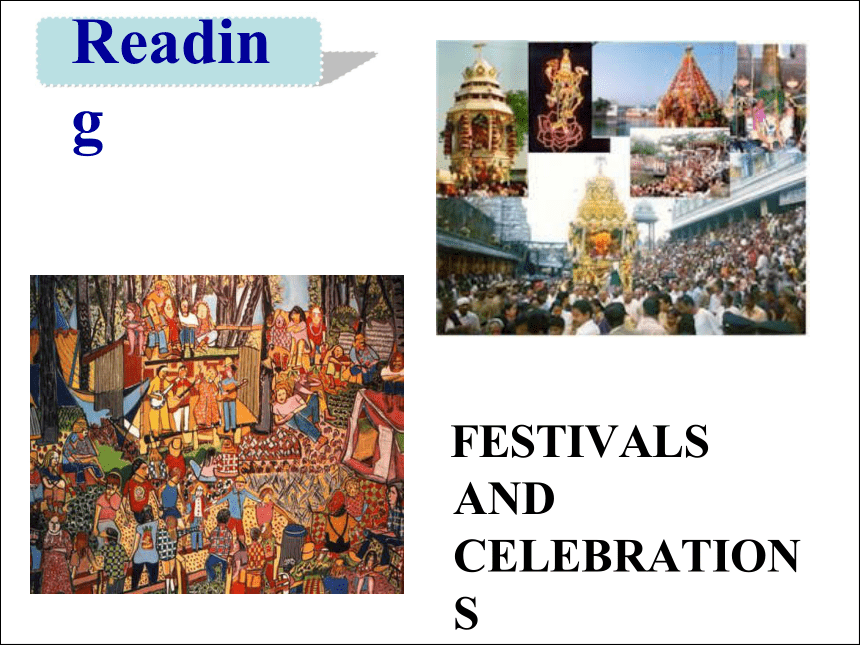 | |
| 格式 | zip | ||
| 文件大小 | 2.0MB | ||
| 资源类型 | 教案 | ||
| 版本资源 | 人教版(新课程标准) | ||
| 科目 | 英语 | ||
| 更新时间 | 2018-11-13 09:53:45 | ||
图片预览

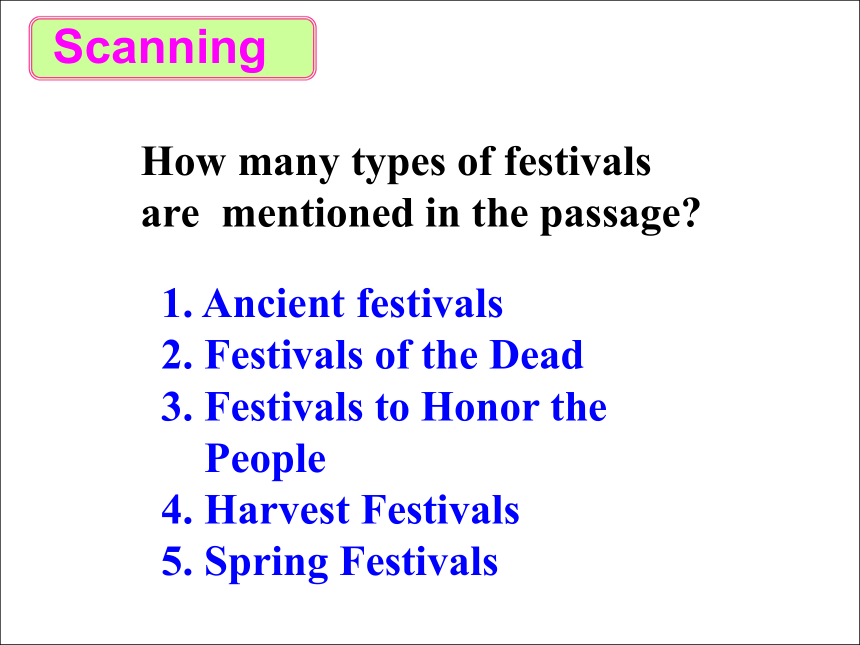
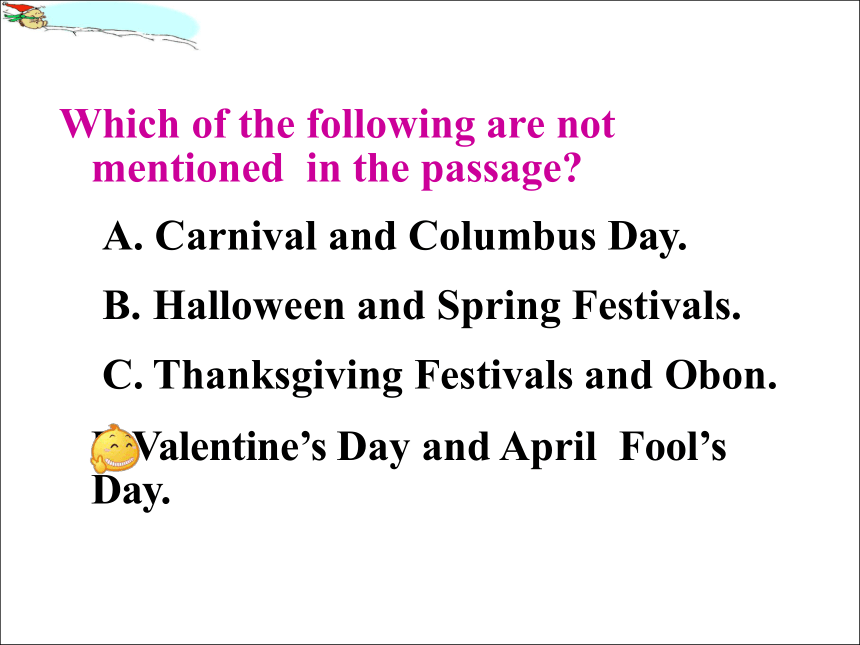

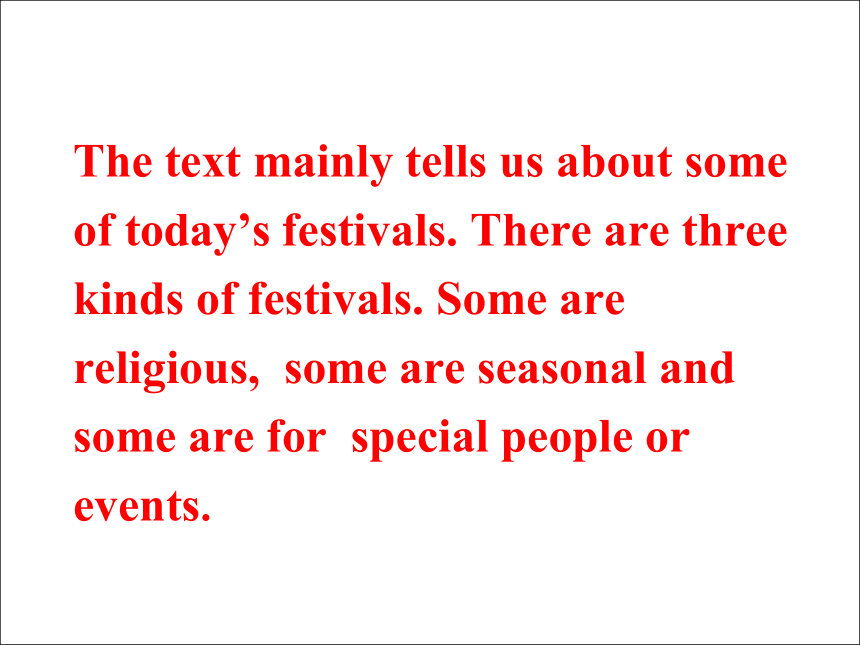
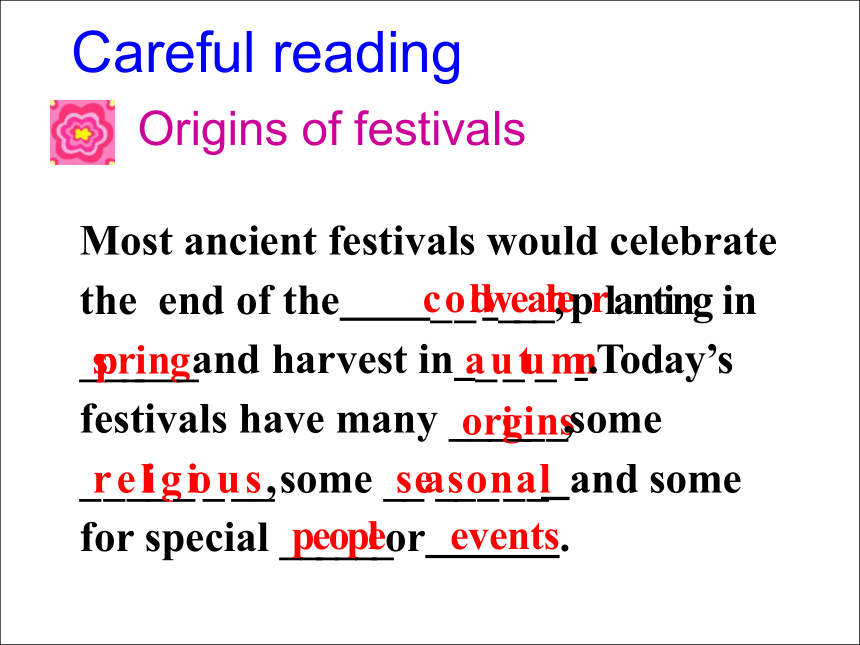
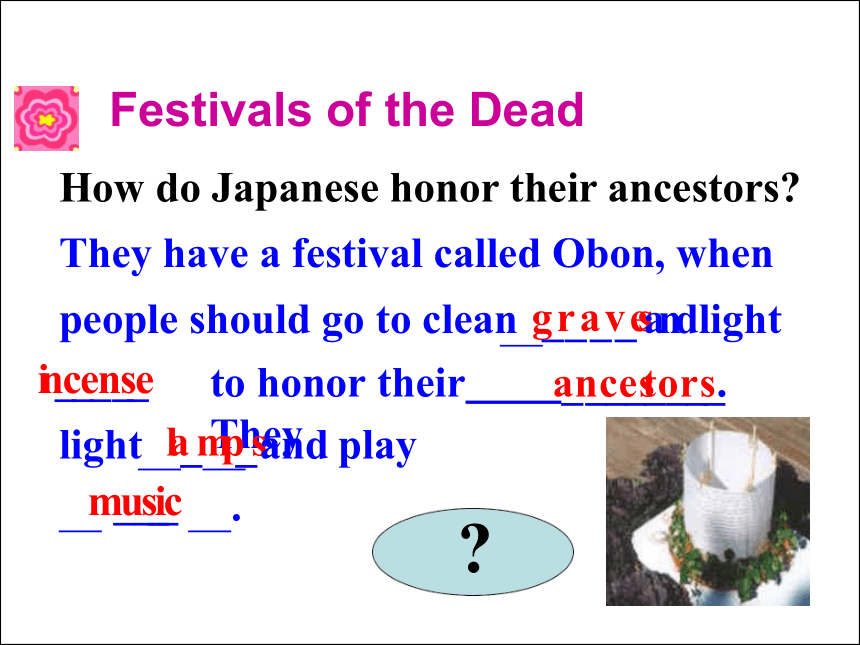
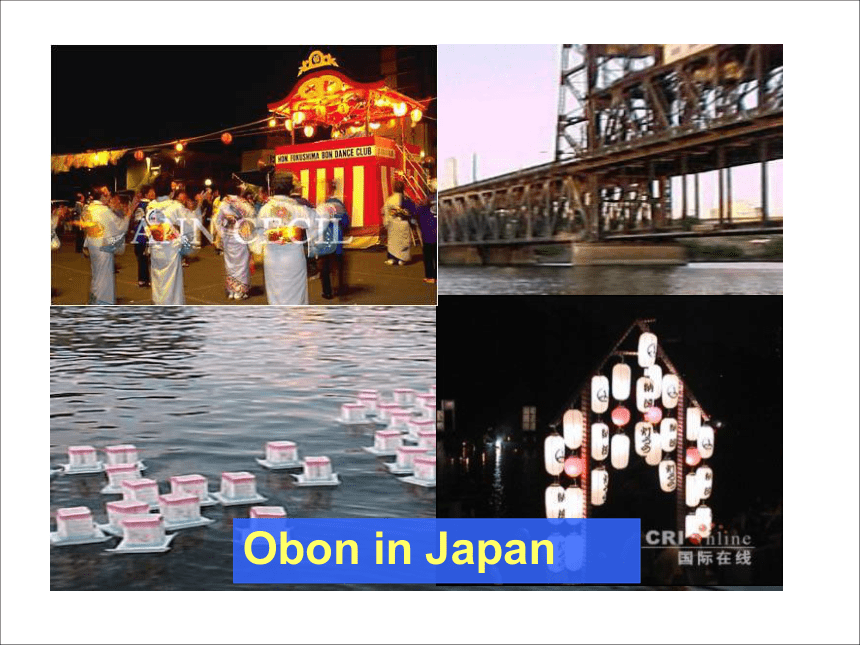
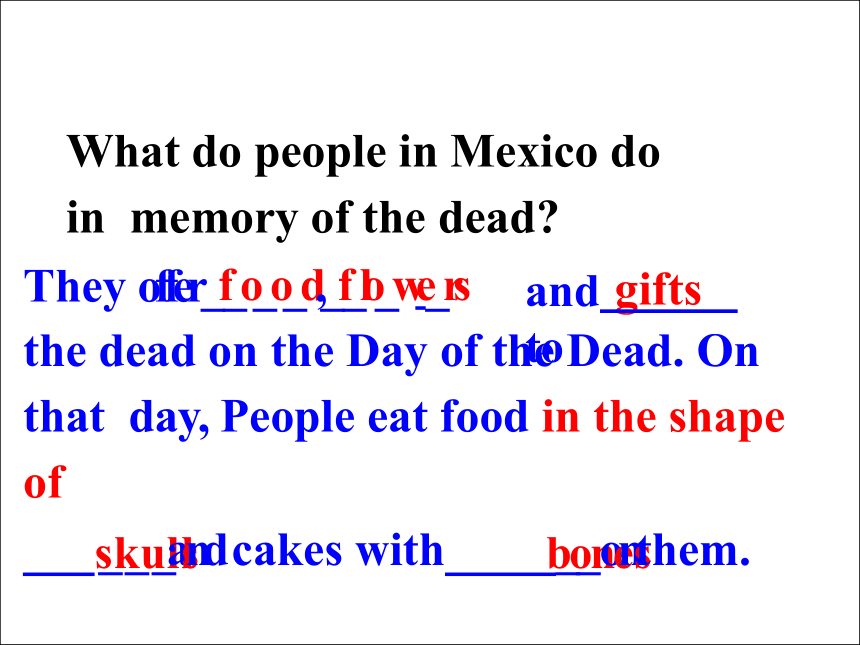
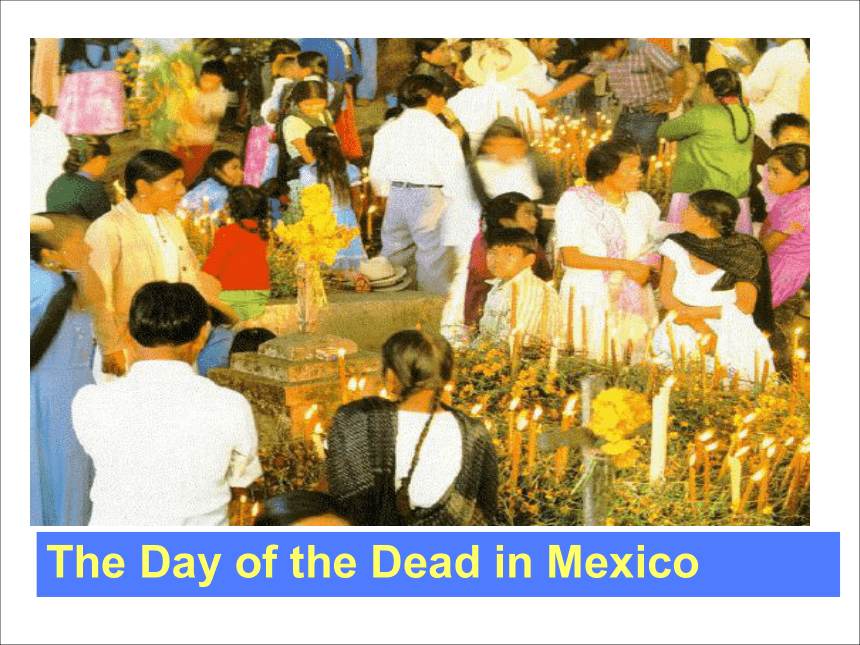
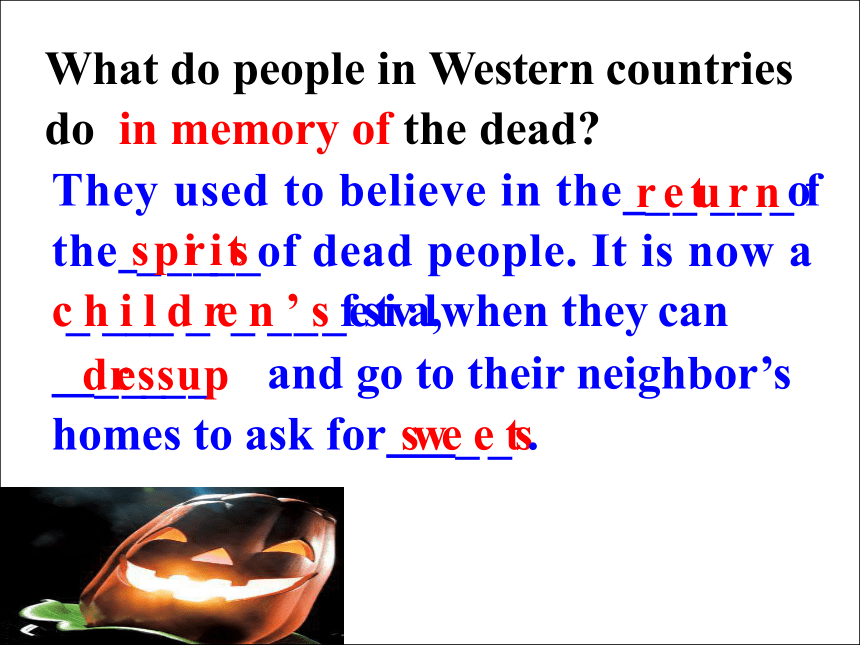
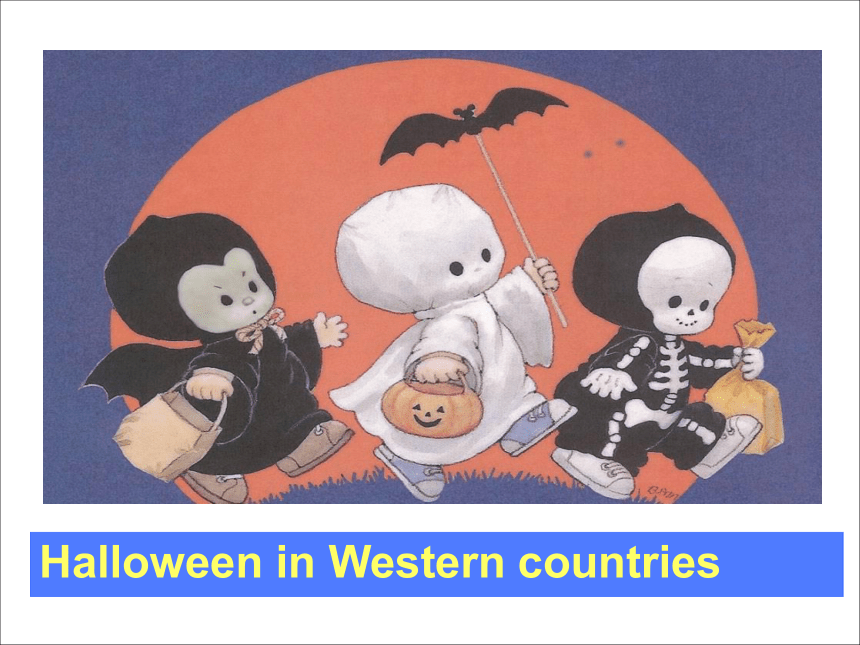
文档简介
课件78张PPT。FESTIVALS AND CELEBRATIONSReadingHow many types of festivals are mentioned in the passage?
Ancient festivals
Festivals of the Dead
Festivals to Honor the People
Harvest Festivals
Spring FestivalsScanningWhich of the following are not mentioned in the passage?
Carnival and Columbus Day.
Halloween and Spring Festivals.
Thanksgiving Festivals and Obon.
Valentine’s Day and April Fool’s Day.Read the text quickly and answer the following question.
What’s the main idea of the text? How many kinds of festival are mentioned? What are they?The text mainly tells us about some of today’s festivals. There are three kinds of festivals. Some are religious, some are seasonal and some are for special people or events.Most ancient festivals would celebrate the end of the c_o_ld w_e_a_th, eprlanting in
_sp_r_i_n_g_ and harvest in a_u_tu_mn. Today’s festivals have many _o_r_ig_i_n_s, some
_r_e_li_g_io_u_s_, some _s_ea_s_o_n_a_l and some for special _p_e_o_p_le_ or events.Careful reading
Origins of festivals.Festivals of the DeadHow do Japanese honor their ancestors? They have a festival called Obon, when people should go to clean g_r_a_v_esand lightin_c_e_n_s_eto honor their a_n_c_e_st_o_r_s_. Theylight la_mp_s and playm_u_s_i_c?Obon in JapanWhat do people in Mexico do in memory of the dead?They offer_f_o_o_d,_f_lo_we_rs and gifts tothe dead on the Day of the Dead. On that day, People eat food in the shape of
s_k_u_lalsnd cakes with b_o_noens them.The Day of the Dead in MexicoWhat do people in Western countries do in memory of the dead?
They used to believe in the r_e_tu_r_n_of the s_p_ir_i_ts_ of dead people. It is now a c_h_i_l_d_re_n_’_s_festival, when they can
d_re_s_s_u_p and go to their neighbor’s homes to ask for swe_e_ts.Halloween in Western countriespumpkin head maskCompare the festivals of the dead in Mexico, Japan and China. What things are similar and what things are different?
The Chinese, Japanese and Mexican festivals of the dead all have customs to h_o_ntohre dead.
The Chinese and Japanese
g_o t_o_c_l_ea_n th_e_i_r_a_n_c_e_st_o_r_s’_g_r_a_v_e_s . However, there are some differences.
The Mexicans,
e_a_t_f_o_o_d in sh_a_p_e o_f _s_k_u_ll_s_a_n_d_c_a_k_e_s_wit_h
_b_o_n_es o_n_t_h_e_m ,something the Chinese and Japanese do not do.Festivals to Honor People
Match the festivals with the proper people.The Dragon Boat Festival
ChinaNational Festival on October 2
IndiaColumbus Day
USAHarvest Festivals
People will on Thanksgiving festivals.
decorate churches and town halls
get together to have meals
win awards for their farm produceDifferent from Thanksgiving festivals in Western countries, what activities do China and Japan have in mid-autumn festivals?People a_d_m_i_re_ the moon and in China, enjoy m_o_o_n_c_a_k_e_s_.Spring FestivalsWhat do people usually do at Spring Festival?Chinese People usually eatSome Western countries haved_ump_li_n_g_s_,f_is_h_a_n_d_me_atand give children lu_c_k_y mo_n_e_y_i_n_r_e_d_p_a_p_e_r . There are _d_r_a_g_o_n d_a_n_c_e_s _and c_a_r_n_iv_a_l_s_,and families celebrate the L_un_ar N_e_w Y_e_a_r together.ca_r_n_iv_a_l_s_,including p_ar_a_d_e and dances in the streets
d_a_y a_n_d_n_i_g_h_t , loud music and colorful c_l_o_th_i_n_g_o_f_a_l_l _k_in_d_s .What does Easter celebrate?
It celebrates the return of J_e_sufsrom the dead and the coming of s_p_r_in_g
and n_e_w li_f_e_.
Do you know the symbols(象征) of Easter?
Easter eggs and Easter
Bunnies(rabbits).节日和庆典
自古以来,世界各地就有各种各样的 节日和庆典。大多数古老的节日都是 庆祝严寒的结束,春季的种植和秋天 的收割。有时,当猎人捕获猎物后, 也举行庆祝活动,在那个时代,如果 食物难以找到,特别是在寒冷的冬天, 人们会挨饿。现在的节日有很多由来, 一些是宗教上的,一些是季节性的, 一些是纪念特殊的人和事件的。亡灵节
有些节日,是为了纪念死者,或使祖先得到满 足,因为祖先们有可能回到世上(给人们)提供 帮助,也有可能带来危害。在日本的盂兰盆节, 人们要扫墓、烧香,以缅怀祖先。他们还点起灯 笼,奏响乐曲,因为他们认为这样做可以把祖先 引回到世上。在墨西哥,亡灵节是在11月初。在 这个重要的节日里,人们会吃制成颅骨形状的食 物,和装点有骨头的蛋糕。他们向亡者祭献食物、 鲜花和礼品。万圣节也源自人们古老的信念,认 为亡者的灵魂会返回人间。万圣节如今成了孩子 们的节日,这天他们可以乔装打扮到邻居家要糖 吃。如果邻居什么糖也不给,孩子们就会捉弄他 们。纪念名人的节日
也有纪念名人的节日。中国的端午 节(龙舟节),是纪念古代著名诗人 屈原的。美国的哥伦布日是纪念克里 斯托弗?哥伦布发现“新大陆”的日子。 印度在10月2日有个全国性节日,纪念 默罕达斯?甘地,他是帮助印度摆脱英 国的统治而独立的领袖。庆丰收的节日
收获与感恩节是非常喜庆的节日。过冬 的粮食收集起来了,农活结束了,人们都 心怀感激。在欧洲国家,人们通常用花果 来装饰教堂和市政厅,在一起聚集。有些 人还可能因为他们的农产品(参加各种评 选)而获奖,比如最大的西瓜或最帅的公 鸡。中国和日本都有中秋节,这时,人们 会赏月。在中国,人们还品尝月饼。春天的节日最富有生气而又最重要的节日,就是告别冬天,迎 来春天的节日。中国人过春节要吃饺子、鱼和肉,还要 给孩子们送红纸包着的压岁钱。(他们)舞龙灯、狂欢 全家人聚在一起欢庆阴历新年。在一些西方国家有激动 人心的狂欢节,通常在二月,复活节前的四十天。狂欢 节期间,人们身着各种艳丽的节日盛装,伴随着响亮的 音乐,在街头游行,昼夜跳舞。复活节是全世界基督徒 的一个重要的宗教和公众节日。它庆祝耶稣复活,也欢 庆春天和新生命的到来。再晚些时候,日本就迎来了樱 花节。(节日里)整个国家到处是盛开的樱花,看上去 就像覆盖了一层粉红色的雪。
人们喜欢聚在一起吃、喝、玩耍。节日让我们享受 生活,让我们为自己的习俗而自豪,还可以暂时忘掉工 作中的烦恼Kinds of FestivalsNames of Countries FestivalsFestivals of the DeadObonJapanthe Day of the DeadHalloweenMexico Some WesterncountriesComprehending
1 Read the passage and then fill in the following chart.Kinds of Names of Festivals FestivalsCountriesFestivals to Honour Peoplefestival to honour GandhiIndiaDragon Boat FestivalColumbus DayChinaUSAKinds of Names of Festivals FestivalsCountriesHarvest FestivalsHarvest/ Thanksgiving festivals;European and other countries;mid-autumn festivalsChina and JapanKinds of Names of Festivals FestivalsCountriesSpring FestivalsCherry Blossom FestivalJapanSpring FestivalEaster and related holidaysChinasome Western countries2 Use the information from the reading passage to answer the following question.
1). What are festivals of the dead usually for?
Festivals of the dead are for honouring or satisfying dead ancestors or others, who some people believe might return to help or harm living people.What makes autumn festivals happy events?
Autumn festivals are happy events because people are thankful that food is ready for winter and the hard farm work is finished.
What do people usually do at spring festivals?
At spring festivals, people usually have dances, carnivals and other activities to celebrate the end of winter and the coming of spring.4). What is one important reason to have festivals and celebrations?
It is important to have festivals and celebrations so we can enjoy life/ be proud of our customs/ forget our work for a little while.5). Compare the festivals of the dead in Mexico, Japan and China. What things are similar?
What things are different?The Chinese, Japanese and Mexican festivals of the dead all have customs to honour the dead. The Chinese and Japanese go to clean their ancestors’ graves, and the Mexicans offer food, flowers and gifts to the dead. However, there are some difference. The Mexicans eat special food that looks like bones, something the Chinese and Japanese do not do.3 Based on the reading passage, what do most festivals seem to have in common? why do you think these things might be important to people everywhere Talk with your partner and fill in the chart below.
Three common things might be from the following: food, music, entertainment, being with family and friends, dance, lights or fires, remembering events or people.
Reasons why they are important to people everywhere:Festivals let us enjoy life ,be proud of our customs and forget our work for a little while.Type of festivalExample of festivalReasons for your choiceMost important
Most fun4 Discuss in pairs which festivals you think are the most important and which are the most fun. Then fill in the blanks with your ideas.1. Festivals are meant to celebrate important times of year.
节日就是庆祝一年中重要的日子。
mean 的用法
1). mean doing sth.意味着
Playing all the time means failing the exam.
整天玩耍意味着考试失败。Language points2) mean to do sth. 打算或企图做……
①抱歉,我不是故意伤害你的。 Sorry, I didn’t mean to hurt you. Sorry, I mean no harm to you.
had meant to 本来打算做……
②我本来打算先做英语练习的。
I had meant to do English exercises first.
③抱歉,我不是故意的。
Sorry, I didn’t mean it.In some parts of London, missing a busmeansA. waiting
C. waitAfor another hour.
B. to wait
D. to be waiting句意为:在伦敦的一些地方,错过 一班公共汽车意味着再等一个小时。
想一想2. take place 发生;举行
①演出没有进行。
The performance didn’t take place.
②事故发生时,有人路过那里吗?
Was there anybody passing by when the accident took place?Great changes B_ in the rural areas in the last two decades.
A. are happening B. have taken place
C. took place D. have been taken place
take place 不能用于被动语态中,句中 短语 in the last two decades 可确定句子 的时态为现在完成时。与place相关短语:in the first place (用于列举理由)首先
in the last place 最后
in place of 代替,用……而不用……
take one’s place 找某人接替某人的位置3. Festivals and celebrations of all kinds have been held everywhere.all kinds of
the same kind of different kinds of this/that kind of a kind of各种各样的 相同种类的 不同种类的 这(那)种
某种① 我们卖各式各样的鞋。
We sell all kinds of shoes.
= We sell shoes of all kinds.
②那类问题是很难解答的。
That kind of questions is very difficult to answer.
= Questions of that kind are difficult to answer.4. starve v. 1)挨饿;饿死
Millions of people starved to death during the war. 战争中数百万人挨饿至死。 2)starve for sth=be starved of sth
=long for渴望得到
e.g.这些无家可归的孩子渴望得到爱。 The homeless children starved for/were
starved of love.3)感觉很饿(仅用于进行时态) When will dinner be ready ? I’m starving.
晚饭什么时候做好?我快饿死了。5. honour
n. 1) 光荣,荣誉
e.g.他们为了国家的荣誉而战。
They fight for the honour of the country.
2) in honour of 纪念…;向…表示敬意
e.g.这个节日是为了纪念英雄而确立的。 The festival is set in honour of the hero.3) an honour 光荣的人或事情
e.g.刘翔是我国的光荣人物。
Liu Xiang is an honour to our country.
vt. 4) 尊敬,给以荣誉
e.g.孩子们应该尊敬父母。
Children should honour their parents.6. …or satisfy the ancestors , who could return either to help or to do harm.
①satisfy vt. 使满意
e.g.很难使每个人都满意。 It’s hard to satisfy everyone.
②do harm to sb/sth. =harm sb/sth. 伤害…
e.g.在阳光下看书会伤害我们的眼睛。 Reading in the sun does harm to eyes.7. in memory of 纪念(与动词或be连用)
①这个博物馆是为了纪念那位著名的科 学家而建立的。
The museum was built in memory of the famous scientist.
②他写了首感人的长诗来纪念他的妻子。
He wrote a long moving poem in memory of his wife.8. dress vt. (+sb./oneself) “给…穿衣服”。
e.g. 唤醒孩子,给他们穿上衣服。
Wake up children and dress them. get dressed 穿衣服
be dressed in+衣服/颜色 “穿着……”
= be in+衣服/颜色
e.g. 这个女孩穿着一身红衣服。
The girl was dressed in red.dress up (as...) 打扮/化妆(成……)
快点打扮好,我们得走了。 Dress up quickly; we have to go.
派对上Tom把自己打扮成一个天使。 Tom dressed himself up as an angle in the
party.gain vt. & vi. 获得;赢得
I have g_ai_n_e_d_a lo_t_o_f fr_ie_n_d_s
since I arrived.
我到这里以后,结识了很多朋友。 (2)He had g_a_in_e_d w_e_i_g_h_t and looked much better.
他体重增加,脸色好看多了。n. 收获
(1)No _p_a_in_s , no gains . 不劳无获。 (2) A_f_a_l_l into the pit, _a g_a_in_ in your wit. 吃一堑,长一智。10. award
n. 奖品,奖项,奖金, 助学金
Mary got an award and was able to finish her study.
vt. 授予……;裁定……
award sb. sth./sth. to sb. 授予某人某物
win/receive/get an award for
因……而获奖They awa_rd_e_d John the first prize.
他们授予约翰一等奖。
He won _t_h_e_a_w_a_r_d_f_o_r his excellent skill.
他由于他出色的技能而获奖。11. admire vt. 钦佩;赞赏;欣赏
admire sb/sth (for sth)
①他们很欣赏我们的花园。
They admired our garden very much.
②我羡慕他生意上的成功。
I admire him for his success in business. admire oneself in the mirror照镜自怜hiscomments on this new film.我期待听到他 对这部新影片的评论。12. look forward to 期望;期待;盼望
(1)My mother said she was
_l_o_o_k_in_g fo_r_war_d to m_e_e_ti_n_g you.我妈妈说她正期待着与你见面。
(2)I was _l_o_o_k_in_g f_o_rwa_rd to h_e_a_ri_n_g look forward to 结构中的 to为介词,其后 接名词或动名词(动词ing形式)。
类似的动词短语还有: be/become/get used to 习惯于…… pay attention to 注意
devote...to... 把……致力于……
prefer...to...宁愿……也不……13. as though/ if+句子:“好像”
①今天你看上去好像病了。
It looks as though you are ill today.
②他表现得若无其事。
He acted as if nothing had happened.14. People love to get together to eat, drink and have fun with each other.
have fun with 玩……玩得很开心/高兴
e.g. Now you can find your passion for exercise and have fun with your kids at the same time.
The children are having a lot of fun with the building blocks.have fun意为“过得快乐”。同义词组 为have a good time, enjoy oneself。短语 有:have fun (in) doing sth. 快乐地做某 事。
【拓展】
for fun 为了高兴
in fun 开玩笑地,不是当真的
make fun of sb. 取笑某人,嘲弄某人根据汉语提示完成下面短文。
The festival t_ak_e_s p_la_c_e_ (发生) between June 6 and 8 of each year
_in m_e_mo_r_y_o_f_ (纪念) a famous hero in the history of the town. The hero helped the country to g_a_i_n_ (赢得) independence. All
people have been l_o_o_k_in_g fo_r_w_a_r_d(t 盼o
望) it a few weeks before its coming.When the festival actually comes, people will d_re_s_s_u_p (盛装打扮) and se_t_o_f_f_
(出发) for the central square very early in the morning, and g_at_he(集r 合 ) in the square, singing and dancing. Many kinds of games are held too, and those who play
well will b_e a(被wa授rd予ed) a prize. One of the most popular games is to see
who is able to run to a big tree within the shortest time.(玩得很开心).People _a_d_mir_e_ (羡慕) the winners very much. However, they often
p_la_y a_t_ri_c_k_/_t_ri_c_k_s_o_n (开玩笑) them. For example, they may take off the winners’ hats suddenly without telling them. There are also a lot of strange
_c_u_s_t_o_m_s_ (风俗) during the festival. It is clear that all of the people_h_a_v_e a_l_o_t _o_f _fu_n1. Which of these words can become adjectives with the -ous or -al ending? Which can become nouns with the
-(a)tion ending? Choose the correct
ending for each word and then write out the new word. Use the dictionary
to help you.religion danger humour courage
culture nation season originreligious dangerous humourous courageous
cultural national seasonal originalproduce educate celebrate predictproduction education celebration prediction2. Complete the passage below withthe words and expressions in the box.
as though belief celebration Christians custom have fun with origin religious
Many people think that Christmas is a western _c_e_le_b_r_a_ti_o_n_, but in fact it is really a worldwide holiday. Christmas actually started as a re_l_ig_i_o_u_s_ festival celebrated by _C_h_r_i_st_i_an_s around the world.Its _o_r_ig_i_n_ is around the 3rd or 4th century AD, when the coufsrteomembering Jesus’ birth on December 25th first started. Today, of course, many people celebrate Christmas it were just a holiday taos_th_o_u_g_h family, rather than a hoalviedafyunabwoiutht a .
belief3. Complete each of the sentences witha suitable word or phrase from the box in its correct form. Then read theses famous quotes aloud. Can you think of any Chinese idioms or sayings that carry the same meaning?admirefeast starvecustom harvest gathertrick belief gainlook forward toDon’t _l_o_o_k_f_o_rwa_rd t_o_ the day you stop suffering, because when it comes you know you’ll be dead.
— Tennessee Williams
生于忧患,死于安乐.
A dog st_a_rv_i_n_g_ at this master’s gate predicts the ruin of the state.
— William Blake
树死先从叶子黄.3. I would rather have a mind opened by wonder—than one closed by .
GcuesrrtoymSpence
宁愿创新,不愿陈腐.4. _Gat_h_e_r_ you rosebuds while you may, old time is still a-flying, and this same flower that smiles today, tomorrow will be dying.
— Robert Herrick
未雨绸缪.life.— David Hume
信仰是生活的向导.However big the fool, there is always a bigger fool to ad_mi_re_ him.
— Nicholas Boileau-Despreaux
傻瓜总会发现有比他更傻的人在赞美他.
_B_e_l_ie_f , then, is the great guide of human7. Other people’sbest , but one’s own children areh_a_rv_e_s_t_s _ are always theh_a_r_v_es_t_salways the best children.
— Unknown
别人的成就/收获怎么看都比自己的好,而自 己的孩子怎么看都比别人的孩子好.
8. There is no fe_a_s_t_ on earth that does not end in parting. — Unknown
天下没有不散的宴席.Everyone has some tr_i_ck_sthey can do, but each has his own way of doing them.
— Unknown
八仙过海,各显神通.
Those who can lose shall g_a_in_; those who wish for shaglal ilnose. —
Unknown
有意栽花花不开,无心插柳柳成荫./阴差阳错.Modal verbs such as may, might, will, would, can, could, shall, should, and must are used for many purposes. Find the sentences in the reading passage that use modal verbs.Most ancient festivals would celebrate the end of cold weather…
Sometimes celebrations would be held after hunters had caught animals.
At that time people would starve if
food was difficult to find
…or to satisfy the ancestor, who might return either to help or to do harm.
For the Japanese festival Obon, people should go to clean graves……this will lead the ancestor back to earth.
It is now a children’s festival, when they can dress up and go…
…the children might play a trick on them.
Festivals can also be held to honour famous people.
Harvest and Thanksgiving festivals can be very happy events.In European countries, people will usually decorate … and will get together…
Some people might win awards for their…
At the Spring Festival in China,
people… may give children lucky money in red paper.
These carnivals might include parades, dancing in the streets…
Ancient festivals
Festivals of the Dead
Festivals to Honor the People
Harvest Festivals
Spring FestivalsScanningWhich of the following are not mentioned in the passage?
Carnival and Columbus Day.
Halloween and Spring Festivals.
Thanksgiving Festivals and Obon.
Valentine’s Day and April Fool’s Day.Read the text quickly and answer the following question.
What’s the main idea of the text? How many kinds of festival are mentioned? What are they?The text mainly tells us about some of today’s festivals. There are three kinds of festivals. Some are religious, some are seasonal and some are for special people or events.Most ancient festivals would celebrate the end of the c_o_ld w_e_a_th, eprlanting in
_sp_r_i_n_g_ and harvest in a_u_tu_mn. Today’s festivals have many _o_r_ig_i_n_s, some
_r_e_li_g_io_u_s_, some _s_ea_s_o_n_a_l and some for special _p_e_o_p_le_ or events.Careful reading
Origins of festivals.Festivals of the DeadHow do Japanese honor their ancestors? They have a festival called Obon, when people should go to clean g_r_a_v_esand lightin_c_e_n_s_eto honor their a_n_c_e_st_o_r_s_. Theylight la_mp_s and playm_u_s_i_c?Obon in JapanWhat do people in Mexico do in memory of the dead?They offer_f_o_o_d,_f_lo_we_rs and gifts tothe dead on the Day of the Dead. On that day, People eat food in the shape of
s_k_u_lalsnd cakes with b_o_noens them.The Day of the Dead in MexicoWhat do people in Western countries do in memory of the dead?
They used to believe in the r_e_tu_r_n_of the s_p_ir_i_ts_ of dead people. It is now a c_h_i_l_d_re_n_’_s_festival, when they can
d_re_s_s_u_p and go to their neighbor’s homes to ask for swe_e_ts.Halloween in Western countriespumpkin head maskCompare the festivals of the dead in Mexico, Japan and China. What things are similar and what things are different?
The Chinese, Japanese and Mexican festivals of the dead all have customs to h_o_ntohre dead.
The Chinese and Japanese
g_o t_o_c_l_ea_n th_e_i_r_a_n_c_e_st_o_r_s’_g_r_a_v_e_s . However, there are some differences.
The Mexicans,
e_a_t_f_o_o_d in sh_a_p_e o_f _s_k_u_ll_s_a_n_d_c_a_k_e_s_wit_h
_b_o_n_es o_n_t_h_e_m ,something the Chinese and Japanese do not do.Festivals to Honor People
Match the festivals with the proper people.The Dragon Boat Festival
ChinaNational Festival on October 2
IndiaColumbus Day
USAHarvest Festivals
People will on Thanksgiving festivals.
decorate churches and town halls
get together to have meals
win awards for their farm produceDifferent from Thanksgiving festivals in Western countries, what activities do China and Japan have in mid-autumn festivals?People a_d_m_i_re_ the moon and in China, enjoy m_o_o_n_c_a_k_e_s_.Spring FestivalsWhat do people usually do at Spring Festival?Chinese People usually eatSome Western countries haved_ump_li_n_g_s_,f_is_h_a_n_d_me_atand give children lu_c_k_y mo_n_e_y_i_n_r_e_d_p_a_p_e_r . There are _d_r_a_g_o_n d_a_n_c_e_s _and c_a_r_n_iv_a_l_s_,and families celebrate the L_un_ar N_e_w Y_e_a_r together.ca_r_n_iv_a_l_s_,including p_ar_a_d_e and dances in the streets
d_a_y a_n_d_n_i_g_h_t , loud music and colorful c_l_o_th_i_n_g_o_f_a_l_l _k_in_d_s .What does Easter celebrate?
It celebrates the return of J_e_sufsrom the dead and the coming of s_p_r_in_g
and n_e_w li_f_e_.
Do you know the symbols(象征) of Easter?
Easter eggs and Easter
Bunnies(rabbits).节日和庆典
自古以来,世界各地就有各种各样的 节日和庆典。大多数古老的节日都是 庆祝严寒的结束,春季的种植和秋天 的收割。有时,当猎人捕获猎物后, 也举行庆祝活动,在那个时代,如果 食物难以找到,特别是在寒冷的冬天, 人们会挨饿。现在的节日有很多由来, 一些是宗教上的,一些是季节性的, 一些是纪念特殊的人和事件的。亡灵节
有些节日,是为了纪念死者,或使祖先得到满 足,因为祖先们有可能回到世上(给人们)提供 帮助,也有可能带来危害。在日本的盂兰盆节, 人们要扫墓、烧香,以缅怀祖先。他们还点起灯 笼,奏响乐曲,因为他们认为这样做可以把祖先 引回到世上。在墨西哥,亡灵节是在11月初。在 这个重要的节日里,人们会吃制成颅骨形状的食 物,和装点有骨头的蛋糕。他们向亡者祭献食物、 鲜花和礼品。万圣节也源自人们古老的信念,认 为亡者的灵魂会返回人间。万圣节如今成了孩子 们的节日,这天他们可以乔装打扮到邻居家要糖 吃。如果邻居什么糖也不给,孩子们就会捉弄他 们。纪念名人的节日
也有纪念名人的节日。中国的端午 节(龙舟节),是纪念古代著名诗人 屈原的。美国的哥伦布日是纪念克里 斯托弗?哥伦布发现“新大陆”的日子。 印度在10月2日有个全国性节日,纪念 默罕达斯?甘地,他是帮助印度摆脱英 国的统治而独立的领袖。庆丰收的节日
收获与感恩节是非常喜庆的节日。过冬 的粮食收集起来了,农活结束了,人们都 心怀感激。在欧洲国家,人们通常用花果 来装饰教堂和市政厅,在一起聚集。有些 人还可能因为他们的农产品(参加各种评 选)而获奖,比如最大的西瓜或最帅的公 鸡。中国和日本都有中秋节,这时,人们 会赏月。在中国,人们还品尝月饼。春天的节日最富有生气而又最重要的节日,就是告别冬天,迎 来春天的节日。中国人过春节要吃饺子、鱼和肉,还要 给孩子们送红纸包着的压岁钱。(他们)舞龙灯、狂欢 全家人聚在一起欢庆阴历新年。在一些西方国家有激动 人心的狂欢节,通常在二月,复活节前的四十天。狂欢 节期间,人们身着各种艳丽的节日盛装,伴随着响亮的 音乐,在街头游行,昼夜跳舞。复活节是全世界基督徒 的一个重要的宗教和公众节日。它庆祝耶稣复活,也欢 庆春天和新生命的到来。再晚些时候,日本就迎来了樱 花节。(节日里)整个国家到处是盛开的樱花,看上去 就像覆盖了一层粉红色的雪。
人们喜欢聚在一起吃、喝、玩耍。节日让我们享受 生活,让我们为自己的习俗而自豪,还可以暂时忘掉工 作中的烦恼Kinds of FestivalsNames of Countries FestivalsFestivals of the DeadObonJapanthe Day of the DeadHalloweenMexico Some WesterncountriesComprehending
1 Read the passage and then fill in the following chart.Kinds of Names of Festivals FestivalsCountriesFestivals to Honour Peoplefestival to honour GandhiIndiaDragon Boat FestivalColumbus DayChinaUSAKinds of Names of Festivals FestivalsCountriesHarvest FestivalsHarvest/ Thanksgiving festivals;European and other countries;mid-autumn festivalsChina and JapanKinds of Names of Festivals FestivalsCountriesSpring FestivalsCherry Blossom FestivalJapanSpring FestivalEaster and related holidaysChinasome Western countries2 Use the information from the reading passage to answer the following question.
1). What are festivals of the dead usually for?
Festivals of the dead are for honouring or satisfying dead ancestors or others, who some people believe might return to help or harm living people.What makes autumn festivals happy events?
Autumn festivals are happy events because people are thankful that food is ready for winter and the hard farm work is finished.
What do people usually do at spring festivals?
At spring festivals, people usually have dances, carnivals and other activities to celebrate the end of winter and the coming of spring.4). What is one important reason to have festivals and celebrations?
It is important to have festivals and celebrations so we can enjoy life/ be proud of our customs/ forget our work for a little while.5). Compare the festivals of the dead in Mexico, Japan and China. What things are similar?
What things are different?The Chinese, Japanese and Mexican festivals of the dead all have customs to honour the dead. The Chinese and Japanese go to clean their ancestors’ graves, and the Mexicans offer food, flowers and gifts to the dead. However, there are some difference. The Mexicans eat special food that looks like bones, something the Chinese and Japanese do not do.3 Based on the reading passage, what do most festivals seem to have in common? why do you think these things might be important to people everywhere Talk with your partner and fill in the chart below.
Three common things might be from the following: food, music, entertainment, being with family and friends, dance, lights or fires, remembering events or people.
Reasons why they are important to people everywhere:Festivals let us enjoy life ,be proud of our customs and forget our work for a little while.Type of festivalExample of festivalReasons for your choiceMost important
Most fun4 Discuss in pairs which festivals you think are the most important and which are the most fun. Then fill in the blanks with your ideas.1. Festivals are meant to celebrate important times of year.
节日就是庆祝一年中重要的日子。
mean 的用法
1). mean doing sth.意味着
Playing all the time means failing the exam.
整天玩耍意味着考试失败。Language points2) mean to do sth. 打算或企图做……
①抱歉,我不是故意伤害你的。 Sorry, I didn’t mean to hurt you. Sorry, I mean no harm to you.
had meant to 本来打算做……
②我本来打算先做英语练习的。
I had meant to do English exercises first.
③抱歉,我不是故意的。
Sorry, I didn’t mean it.In some parts of London, missing a busmeansA. waiting
C. waitAfor another hour.
B. to wait
D. to be waiting句意为:在伦敦的一些地方,错过 一班公共汽车意味着再等一个小时。
想一想2. take place 发生;举行
①演出没有进行。
The performance didn’t take place.
②事故发生时,有人路过那里吗?
Was there anybody passing by when the accident took place?Great changes B_ in the rural areas in the last two decades.
A. are happening B. have taken place
C. took place D. have been taken place
take place 不能用于被动语态中,句中 短语 in the last two decades 可确定句子 的时态为现在完成时。与place相关短语:in the first place (用于列举理由)首先
in the last place 最后
in place of 代替,用……而不用……
take one’s place 找某人接替某人的位置3. Festivals and celebrations of all kinds have been held everywhere.all kinds of
the same kind of different kinds of this/that kind of a kind of各种各样的 相同种类的 不同种类的 这(那)种
某种① 我们卖各式各样的鞋。
We sell all kinds of shoes.
= We sell shoes of all kinds.
②那类问题是很难解答的。
That kind of questions is very difficult to answer.
= Questions of that kind are difficult to answer.4. starve v. 1)挨饿;饿死
Millions of people starved to death during the war. 战争中数百万人挨饿至死。 2)starve for sth=be starved of sth
=long for渴望得到
e.g.这些无家可归的孩子渴望得到爱。 The homeless children starved for/were
starved of love.3)感觉很饿(仅用于进行时态) When will dinner be ready ? I’m starving.
晚饭什么时候做好?我快饿死了。5. honour
n. 1) 光荣,荣誉
e.g.他们为了国家的荣誉而战。
They fight for the honour of the country.
2) in honour of 纪念…;向…表示敬意
e.g.这个节日是为了纪念英雄而确立的。 The festival is set in honour of the hero.3) an honour 光荣的人或事情
e.g.刘翔是我国的光荣人物。
Liu Xiang is an honour to our country.
vt. 4) 尊敬,给以荣誉
e.g.孩子们应该尊敬父母。
Children should honour their parents.6. …or satisfy the ancestors , who could return either to help or to do harm.
①satisfy vt. 使满意
e.g.很难使每个人都满意。 It’s hard to satisfy everyone.
②do harm to sb/sth. =harm sb/sth. 伤害…
e.g.在阳光下看书会伤害我们的眼睛。 Reading in the sun does harm to eyes.7. in memory of 纪念(与动词或be连用)
①这个博物馆是为了纪念那位著名的科 学家而建立的。
The museum was built in memory of the famous scientist.
②他写了首感人的长诗来纪念他的妻子。
He wrote a long moving poem in memory of his wife.8. dress vt. (+sb./oneself) “给…穿衣服”。
e.g. 唤醒孩子,给他们穿上衣服。
Wake up children and dress them. get dressed 穿衣服
be dressed in+衣服/颜色 “穿着……”
= be in+衣服/颜色
e.g. 这个女孩穿着一身红衣服。
The girl was dressed in red.dress up (as...) 打扮/化妆(成……)
快点打扮好,我们得走了。 Dress up quickly; we have to go.
派对上Tom把自己打扮成一个天使。 Tom dressed himself up as an angle in the
party.gain vt. & vi. 获得;赢得
I have g_ai_n_e_d_a lo_t_o_f fr_ie_n_d_s
since I arrived.
我到这里以后,结识了很多朋友。 (2)He had g_a_in_e_d w_e_i_g_h_t and looked much better.
他体重增加,脸色好看多了。n. 收获
(1)No _p_a_in_s , no gains . 不劳无获。 (2) A_f_a_l_l into the pit, _a g_a_in_ in your wit. 吃一堑,长一智。10. award
n. 奖品,奖项,奖金, 助学金
Mary got an award and was able to finish her study.
vt. 授予……;裁定……
award sb. sth./sth. to sb. 授予某人某物
win/receive/get an award for
因……而获奖They awa_rd_e_d John the first prize.
他们授予约翰一等奖。
He won _t_h_e_a_w_a_r_d_f_o_r his excellent skill.
他由于他出色的技能而获奖。11. admire vt. 钦佩;赞赏;欣赏
admire sb/sth (for sth)
①他们很欣赏我们的花园。
They admired our garden very much.
②我羡慕他生意上的成功。
I admire him for his success in business. admire oneself in the mirror照镜自怜hiscomments on this new film.我期待听到他 对这部新影片的评论。12. look forward to 期望;期待;盼望
(1)My mother said she was
_l_o_o_k_in_g fo_r_war_d to m_e_e_ti_n_g you.我妈妈说她正期待着与你见面。
(2)I was _l_o_o_k_in_g f_o_rwa_rd to h_e_a_ri_n_g look forward to 结构中的 to为介词,其后 接名词或动名词(动词ing形式)。
类似的动词短语还有: be/become/get used to 习惯于…… pay attention to 注意
devote...to... 把……致力于……
prefer...to...宁愿……也不……13. as though/ if+句子:“好像”
①今天你看上去好像病了。
It looks as though you are ill today.
②他表现得若无其事。
He acted as if nothing had happened.14. People love to get together to eat, drink and have fun with each other.
have fun with 玩……玩得很开心/高兴
e.g. Now you can find your passion for exercise and have fun with your kids at the same time.
The children are having a lot of fun with the building blocks.have fun意为“过得快乐”。同义词组 为have a good time, enjoy oneself。短语 有:have fun (in) doing sth. 快乐地做某 事。
【拓展】
for fun 为了高兴
in fun 开玩笑地,不是当真的
make fun of sb. 取笑某人,嘲弄某人根据汉语提示完成下面短文。
The festival t_ak_e_s p_la_c_e_ (发生) between June 6 and 8 of each year
_in m_e_mo_r_y_o_f_ (纪念) a famous hero in the history of the town. The hero helped the country to g_a_i_n_ (赢得) independence. All
people have been l_o_o_k_in_g fo_r_w_a_r_d(t 盼o
望) it a few weeks before its coming.When the festival actually comes, people will d_re_s_s_u_p (盛装打扮) and se_t_o_f_f_
(出发) for the central square very early in the morning, and g_at_he(集r 合 ) in the square, singing and dancing. Many kinds of games are held too, and those who play
well will b_e a(被wa授rd予ed) a prize. One of the most popular games is to see
who is able to run to a big tree within the shortest time.(玩得很开心).People _a_d_mir_e_ (羡慕) the winners very much. However, they often
p_la_y a_t_ri_c_k_/_t_ri_c_k_s_o_n (开玩笑) them. For example, they may take off the winners’ hats suddenly without telling them. There are also a lot of strange
_c_u_s_t_o_m_s_ (风俗) during the festival. It is clear that all of the people_h_a_v_e a_l_o_t _o_f _fu_n1. Which of these words can become adjectives with the -ous or -al ending? Which can become nouns with the
-(a)tion ending? Choose the correct
ending for each word and then write out the new word. Use the dictionary
to help you.religion danger humour courage
culture nation season originreligious dangerous humourous courageous
cultural national seasonal originalproduce educate celebrate predictproduction education celebration prediction2. Complete the passage below withthe words and expressions in the box.
as though belief celebration Christians custom have fun with origin religious
Many people think that Christmas is a western _c_e_le_b_r_a_ti_o_n_, but in fact it is really a worldwide holiday. Christmas actually started as a re_l_ig_i_o_u_s_ festival celebrated by _C_h_r_i_st_i_an_s around the world.Its _o_r_ig_i_n_ is around the 3rd or 4th century AD, when the coufsrteomembering Jesus’ birth on December 25th first started. Today, of course, many people celebrate Christmas it were just a holiday taos_th_o_u_g_h family, rather than a hoalviedafyunabwoiutht a .
belief3. Complete each of the sentences witha suitable word or phrase from the box in its correct form. Then read theses famous quotes aloud. Can you think of any Chinese idioms or sayings that carry the same meaning?admirefeast starvecustom harvest gathertrick belief gainlook forward toDon’t _l_o_o_k_f_o_rwa_rd t_o_ the day you stop suffering, because when it comes you know you’ll be dead.
— Tennessee Williams
生于忧患,死于安乐.
A dog st_a_rv_i_n_g_ at this master’s gate predicts the ruin of the state.
— William Blake
树死先从叶子黄.3. I would rather have a mind opened by wonder—than one closed by .
GcuesrrtoymSpence
宁愿创新,不愿陈腐.4. _Gat_h_e_r_ you rosebuds while you may, old time is still a-flying, and this same flower that smiles today, tomorrow will be dying.
— Robert Herrick
未雨绸缪.life.— David Hume
信仰是生活的向导.However big the fool, there is always a bigger fool to ad_mi_re_ him.
— Nicholas Boileau-Despreaux
傻瓜总会发现有比他更傻的人在赞美他.
_B_e_l_ie_f , then, is the great guide of human7. Other people’sbest , but one’s own children areh_a_rv_e_s_t_s _ are always theh_a_r_v_es_t_salways the best children.
— Unknown
别人的成就/收获怎么看都比自己的好,而自 己的孩子怎么看都比别人的孩子好.
8. There is no fe_a_s_t_ on earth that does not end in parting. — Unknown
天下没有不散的宴席.Everyone has some tr_i_ck_sthey can do, but each has his own way of doing them.
— Unknown
八仙过海,各显神通.
Those who can lose shall g_a_in_; those who wish for shaglal ilnose. —
Unknown
有意栽花花不开,无心插柳柳成荫./阴差阳错.Modal verbs such as may, might, will, would, can, could, shall, should, and must are used for many purposes. Find the sentences in the reading passage that use modal verbs.Most ancient festivals would celebrate the end of cold weather…
Sometimes celebrations would be held after hunters had caught animals.
At that time people would starve if
food was difficult to find
…or to satisfy the ancestor, who might return either to help or to do harm.
For the Japanese festival Obon, people should go to clean graves……this will lead the ancestor back to earth.
It is now a children’s festival, when they can dress up and go…
…the children might play a trick on them.
Festivals can also be held to honour famous people.
Harvest and Thanksgiving festivals can be very happy events.In European countries, people will usually decorate … and will get together…
Some people might win awards for their…
At the Spring Festival in China,
people… may give children lucky money in red paper.
These carnivals might include parades, dancing in the streets…
同课章节目录
